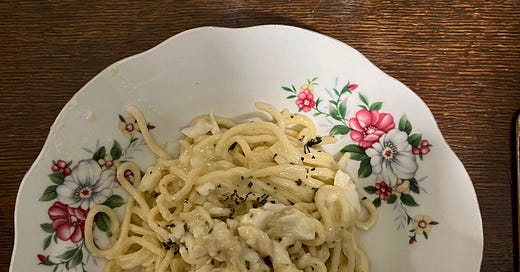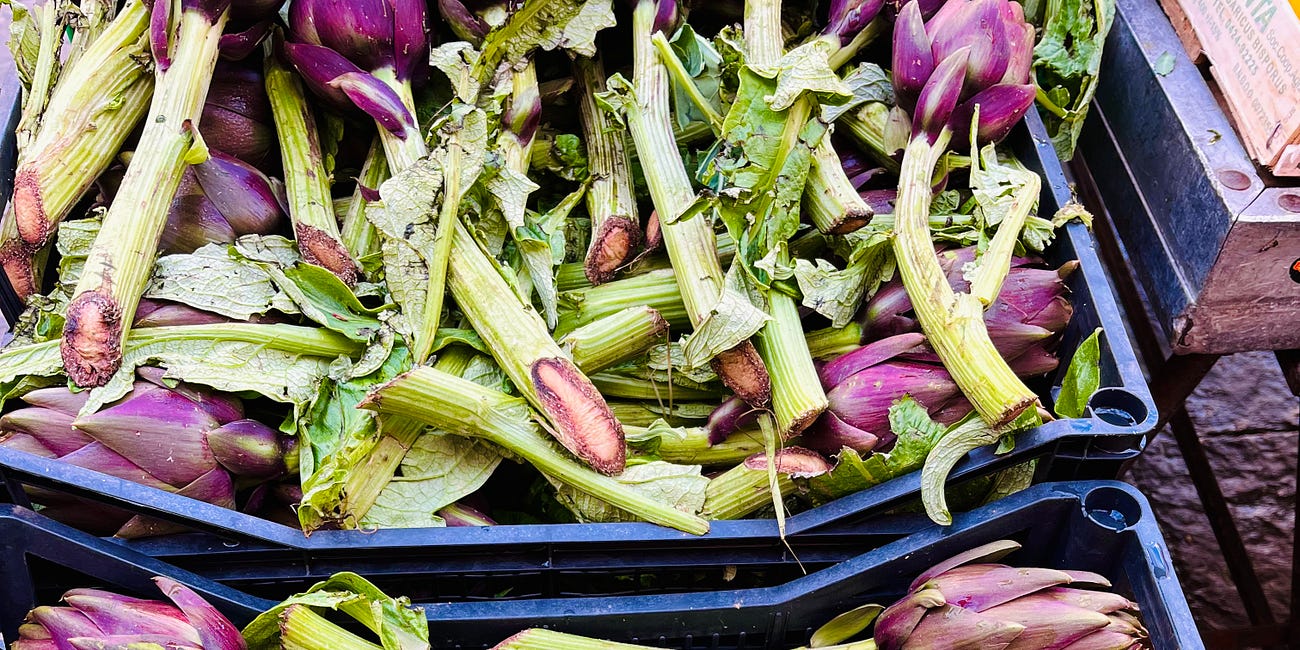As things have a way to sort themselves out, two unrelated events happened. Months ago, I tried a new recipe with friends, time passed, then I had a coffee and a walk with another friend, during which we had one of those open-hearted, nothing too silly nor too romantic nor too anxious can be said, and I came home and put two and two together. Coincidences, as they flirt with the mind, require a certain distance to mature into a relatable feeling.
I am fond of coincidences for what they reveal about the so-called reasonable human. For as long as humans have had hearts, which may be the closest to forever anything ever got to, humanity has been mercurial and corruptible. Whether the distance between two signs being paired as one coincidence is physical or emotional, it isn’t solely the space factor that allows for such an occurrence to become meaningful: flexibility is required too. For an unsolicited hint to ‘make it make sense’ we socialised creatures of habits must recognise that something that was understood as set in stones before – that is, definitive, immovable – has developed into a new form, on its way to becoming something else. That we had been wrong, limiting at the least, before.
Rewinding to New Year’s Eve, when I was in the kitchen with some friends, Leopoldo the dog and my partner L., as we were bound to stay in by the storm outside, we returned to an old skill by mixing semolina flour and lukewarm water. A drizzle of olive oil, and we worked out a dough before rolling long, stripy spaghetti from it. We grabbed two pieces of white fish from the fridge, cut them into cubes, pan fried the fish lightly, then we grated some pecorino Romano and black pepper in a bowl, in plenty enough quantities that we had to take turns, cooked the pasta, mixed everything together and served a fishy cacio e pepe for dinner. Wait, what? Two Italians in the room as well and gone the golden rule not to mix fish and cheese – for the better.

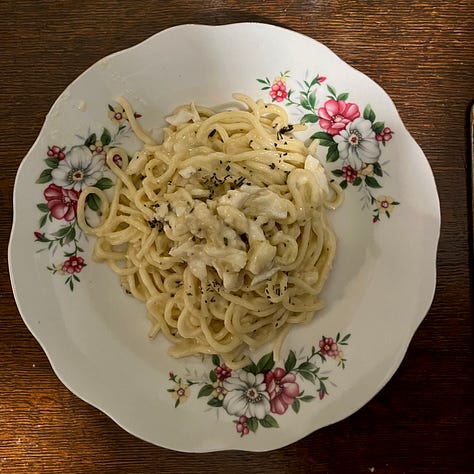
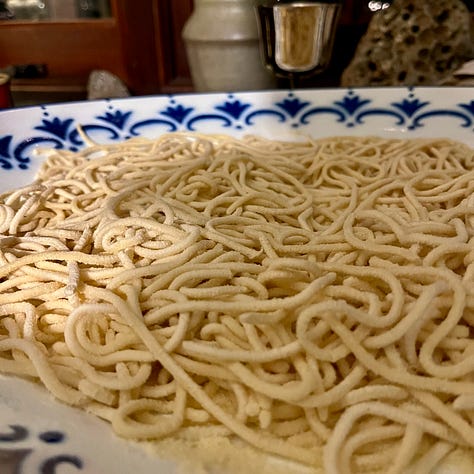
L., my principled (Tuscan) partner when it comes to combining ingredients in preparation of a meal, and other order of things, recognised that he had been sceptical at first but admitted the pasta was delicious. ‘Only fools don’t change their minds,’ I told him, thinking that I was quoting Paulette, my grandmother, but a quick Google search has since indicated that I was quoting Paulette quoting Brigitte Bardot. The point is: knowledge acquisition is subjective, therefore few truths are recognisable by a mass.
Yet, notwithstanding our world being global and multilingual, it can seem oddly terrifying, vulnerable at least, to say something like ‘I have changed my mind’. I am thinking about all the meals that don’t get cooked because they involve too many steps; the evening classes that aren’t started in case they don’t ignite passion; the cities and towns that aren’t discovered; the job, grant, fellowship applications that aren’t being sent; the risks that aren’t taken – what if a choice didn’t land into a forever lasting scenario? As if a decision was deemed to be good only if it resisted the exercise of time, which, I am afraid, in a society where one’s virtue is still primarily quantified against values like heteronormativity, monogamy and entrepreneurship is not as surprising.
If we adults are bad at changing our mind, partly, I think that has to do with the fact that such a recognition goes beyond being wrong. It is more complex in that it isn’t a failure, therefore fixable with a set solution, but it implies that something was incomplete before. It requires seeing time as multidimensional instead of linear, as it carries the past into the present – not growth but progress.
If you will pardon me for pushing that one a tad too far: that cacio e pepe, on a stormy night with friends, at the end of what felt like the end of the world as we knew it (e.g. 2024) needed a touch a fish; it demanded a spin, something salty and stingy. We craved to say: ‘oh, different!’ so we could see things anew but not forget why we had required to see things being renewed in the first place.
It interests me that, to get to that point, I chose to walk through the kitchen and to quote my grandmother as, at the risk of being earnest here, I think that we ought to keep nonna out of our kitchens more often. Let her be in hers and let yourself be wholly in yours. Don’t get me wrong, nobody cooks carrots like Paulette does, and she would convince anyone who dislikes chocolate to come back for a second slice of her dark chocolate tart, either for the taste or because she can be intimidating, but she has her own biases. And I have mine, which I have, albeit slowly and not always firmly, been untangling from the nest of her kitchen – a closeted room where I spent a lot of time as a child. I am not going to teach you anything about confirmation bias, but it is the tendency people have to embrace information that supports their beliefs and reject information that contradicts them.
If Paulette and I share history, she is cooking in a kitchen in a social housing north of Paris and I in a tenement flat in Glasgow. Regardless of where we decide to pin ourselves on the chronological arrow, we are our own entities and seasons taste different outside of each one of our windows; we resent trade wars and how they impact the produce we use differently; the radio has a different tone, though I know we both keep it analogue and loud.
I was reading Rainer Maria Rilke for research recently, and I came across the following lines:
‘Let everything happen to you
Beauty and terror
Just keep going
No feeling is final’— ‘Go to the Limits of Your Longing’, from Book of Hours
The words moved me. I stood up from my chair and headed for a brisk walk, only to conclude that, if the poem had resonated with me as much, it was because it withheld a certain tenderness. No feeling is final is not exactly saying that nothing has to be forever. The thought goes deeper and is liberating, especially to a corrupted, Western soul like mine who tends to dissolve her desires by thinking that endings are the worst thing that can happen to any of us: being made redundant; break up; die. But these are about productivity, or lack thereof. Not how we feel inside, in a sensical manner. They show that reason has evolved into a performance act – that we don’t get from A to B because we got there but because we thought we ought to get there.
‘Let everything happen to you’, Rilke writes. Rilke doesn’t say that this would lead you to become a better version of yourself/ves. Rainer Maria Rilke attended military service during World War I, had seen friends being dispatched to the trenches, some returning from the front, so I find it hard to believe that he would dare say something brushing like ‘what doesn’t kill you make you stronger’ – none of that fighter’s talk but, instead of preparing for a battle, he asks us to please live because life is ‘beauty and terror’ all at once. And we ought to change our minds for the two to let us be complete.
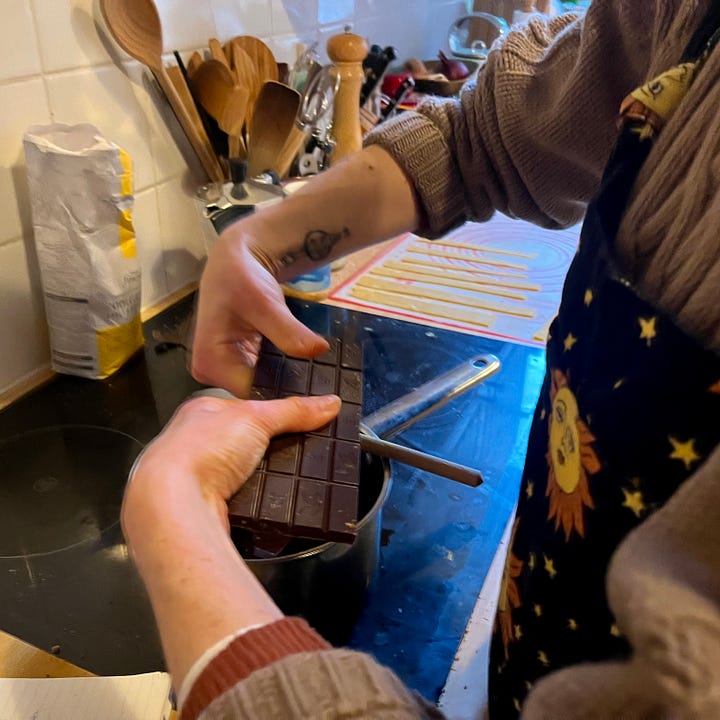
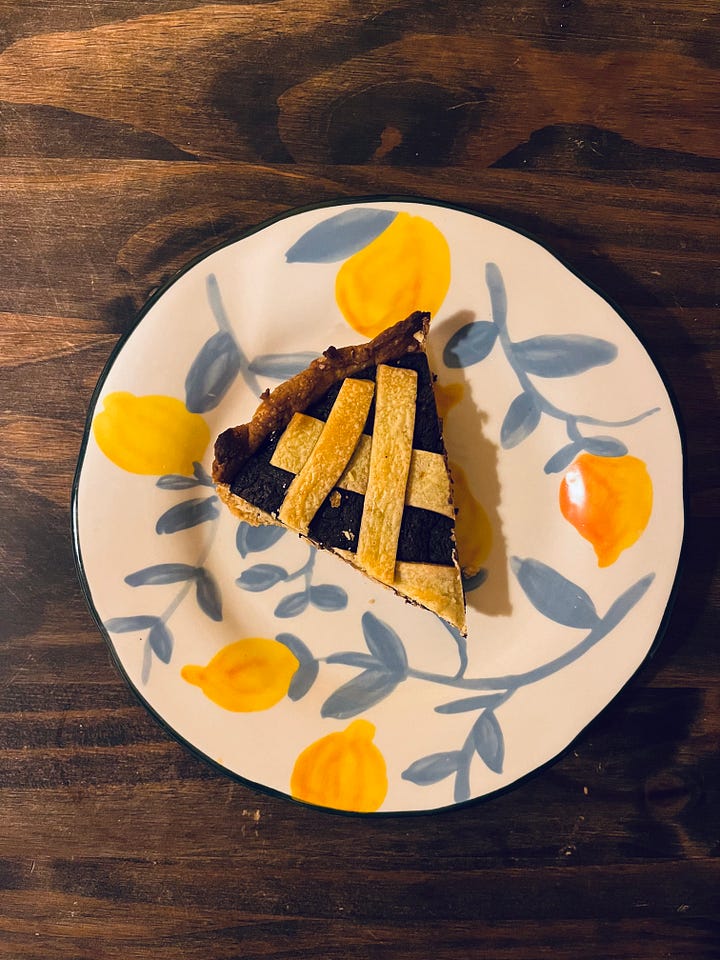
Belligerent and ableist cultures have put a lot of energy in reframing failures as learning experiences. We are advised to do and keep doing, be resilient, be fighters; we are told that maintaining a consistent position is a sign of intelligence and strength. We are taught that changing our minds makes us unreliable and inconsistent. Yet, I am not a scientist, but I bet most progress in science was made because a bunch of wise people kept changing their mind until they solved that equation or found that vaccine, or else.
Let’s be cooks and bring nonna back in instead, just for a second. Ask grandma how it was to cook during the war; ask a single parent about their relationship with the kitchen; if you asked my mamie and mother, as I did, they would tell you that being adaptable is key – that nothing is just true and all recipes lead to a meal, eventually. ‘Le panier de la ménagère ne ment pas, Margaux.’ My mother emphasised, as she insisted that a shopping basket holds more truths about a place and its community than any headlines could ever capture. A shopping basket doesn’t lie. It has taken me years to understand what she had meant fully – our concept of reality isn’t fixed, as much as the mind shouldn’t get too comfortable, because it is how we survive. We must adapt. There would have been no evolution on our planet if species hadn't changed their minds routinely, so they could thrive in a changing environment and therefore keep reproducing. Being adaptable, quick, flexible are prime to life on Earth – they are the qualities that make us earthlings, not the so-called, highly praised consistency. Nobody can afford to be stubborn in the face of scarcity.
‘I believe that one of the most dignified ways we are capable of, to assert the reassert our dignity in the face of poverty and war's fears and pains, is to nourish ourselves with all possible skill, delicacy, and ever increasing enjoyment. And with our gastronomical growth will come, inevitably, knowledge and perception of a hundred other things, but mainly of ourselves. Then Fate, even tangled as it is with cold wars as well as hot, cannot harm us.’
— wrote M.F.K. Fisher in, How to Cook a Wolf, her ‘cookery book and/or disaster survival guide’ that was first published in 1942.
Let’s be honest, life doesn’t follow a scheme but things derail often. From the mundanity of a train cancellation to Trump being elected, again, and the power being cut off, again, in Gaza, another heatwave in forecast and more oil being drilled from the bottom of our seas, we are all going to get sick and grieve for some of the people we love the most. We are all going to have to reassess life as we do it – to change our mind about it, whatever it is.
Starting small helps to build confidence. Just a few days ago, as we were walking through the botanical gardens with a friend, they interrupted me mid-sentence: ‘Oh, peever!’ They said, and I looked ahead, uncertain about what they meant, then I landed my eyes on the colourful drawing lines that laid on the ground, a pattern of square shapes with numbers written inside each one of them. ‘La marelle!’ I responded. We shared a few memories about playing hopscotch, agreeing that empty snail shells make good substitutes for pebbles but disagreeing on the design of the ladder. I told my friend that, in my time, we didn’t start with 0 but Earth, climbing up to the Sky instead of 9. We moved on, passing plenty of other drawings, some feeling familiar like a checkers game, and others I had never seen before. Some lines had been erased by the rain, perhaps, or were simply given up. I thought, as we walked, that there is one thing children are good at: to change their mind. In the library, I always smile at the piles of books scattered on the floor when I walk in, because kids read a page, drop the book, pick another one, a few more pages, and life goes on, ideas drifting in and out. Still, they are learning as they do, assimilating a form of knowledge through a constant process of association and dissociation.
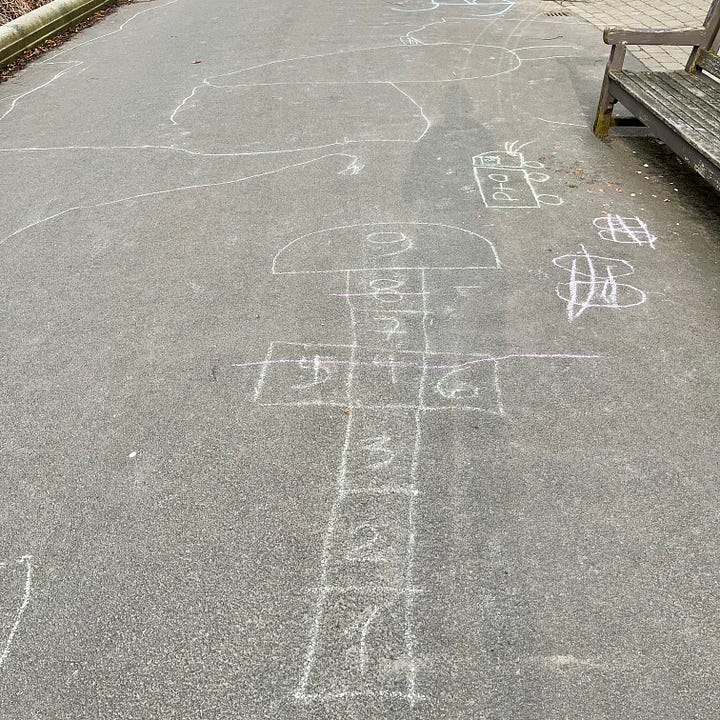
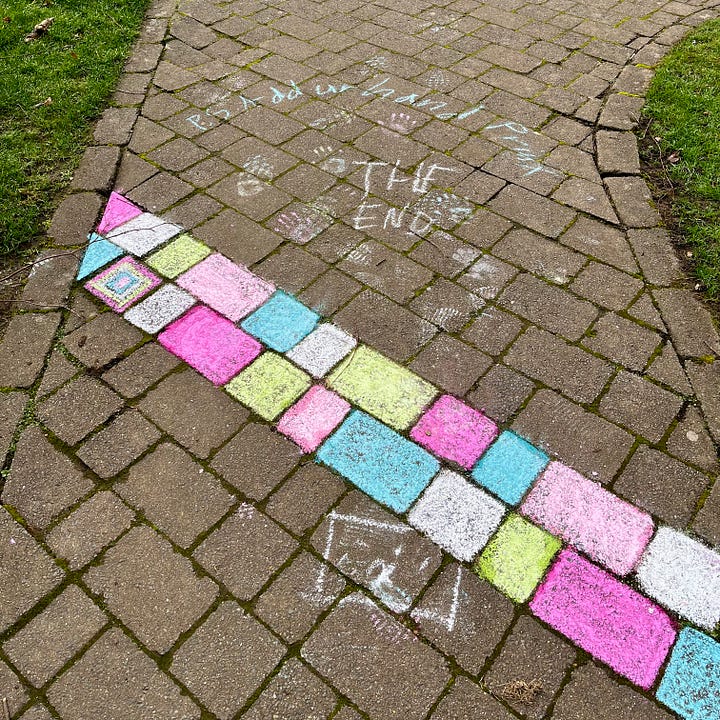
If children are good at playing, they are fluent in being present too. If you were reading this newsletter last year, you might remember that I went to the Barbican to see Francis Alÿs’ Ricochets, a multi-screen installation and the result of the two decades he spent filming children’s games over fifteen countries.
I have swirled back to Alÿs’ clips, noticing how these children still play around the world, some on cemented playgrounds and others in refugee camps, looking for traces from the past to understand how I am feeling about the future. Coincidentally, last month, for Gaelic week in Glasgow, L. and I attended a screening from the Cinema Sgìre collection, which are videotapes produced by communities in the Outer Hebrides between the 1970s and 1980s, followed by a Q&A. When people were asked if they thought things on the islands where they (had) live(d) were better ‘now’, individually they answered that things were different. Not worse, not better, different. This – such an uncertain, open response filled me with a raw form of hope, like the origin of an idea. Simply different; not better but different, thus changeable. It is true that, as a writer, I enjoy the drafting process greatly but, then, perhaps knowledge lies in the accumulation of how wrong we all were and are, at all times, and our responses to that. How we renew ourselves in the light of what has happened to us and to others, side by side with nature. I often wonder if chameleons will dye in new shades to adapt to climate change; change their mind about green once all the grass will have browned under the sun, maybe they already have, only I haven’t caught them doing it yet.
I have changed my mind, such a relieving catchy thing to say. Imagine what comes next, then; what the alternative could be – open, creative, malleable.
It could be a fishy cacio e pepe, it could be mamie’s chocolate tart but dairy free, it could be a world where oil isn’t our prime energy source. Gaza can be free. It could be a society where an universal income and public health care are guaranteed to all. In recognising that something wasn’t working or has become inadequate, we open ourselves to being curious and admit that there could be something else, done with a different mindset.
On the first day of this year, L. reheated the leftover pasta for breakfast. I found him smiling in the kitchen as I walked in, and he said: ‘Happy New Year,’ before stuffing a portion of fishy cacio e pepe in his mouth. Everything all at once felt new then. It was a rare and privileged affair too, precious, as some circles of violence take longer to break than others and, while it is undeniable some will require far more than a change of mind, systemic change must begin somewhere.
As far as coincidences go, I finished listening to Émile Zola’s Germinal as I saved a draft of this newsletter, to be reminded that: ‘Nothing is ever finished; only a little happiness is needed for everything to begin again.’
Keep changing your mind, you mercurial and hopeful readers,
margaux
thank you for reading The Onion Papers. i’m margaux, a writer and cook, and this is my hybrid newsletter. feel free to invite friends to the party.
PS. you can subscribe and come back for seconds (thursdays are for long reads and mondays for annotated recipes, both come out every other weeks).
How to Trim an Artichoke
Few vegetables have as much heart as the artichoke. An edible flower in the thistle family, the artichoke wears a green armour and greets those who venture near them with pointy arrows.


